
Since its establishment on 16 November 2009, the
Faculty of Medicine and Health Sciences
(FMHS) has aspired to be the preferred centre of education and research for
medical and health sciences. FMHS is devoted to producing competent,
professional, compassionate and ethical graduates who are committed to
clinical practice, research, lifelong learning and improvement, as well as
the welfare of the community and the environment. In no time, it became a
highly recognised faculty for nurturing doctors, nurses, and
physiotherapists who are well-trained in the medical profession.
The community of faculty professors, researchers,
staff, students and alumni whose commitment to excellence, quality and
engagement has helped to build the FMHS as a premier learning and teaching
institution that continues to set standards of excellence in the academic
and medical fraternity. As a result, UTAR’s
medical graduates are very well received by the hospitals and more than 250
medical graduates have obtained clinical training and employment thus far.
In view of the 11th anniversary of FMHS
this year, the faculty has gathered Bachelor of Medicine and Bachelor of
Surgery (MBBS) alumni to share their experiences of working in the medical
line. They shared their life experience in the medical field, the challenges
encountered along the way, personal views regarding healthcare workers and
many more.
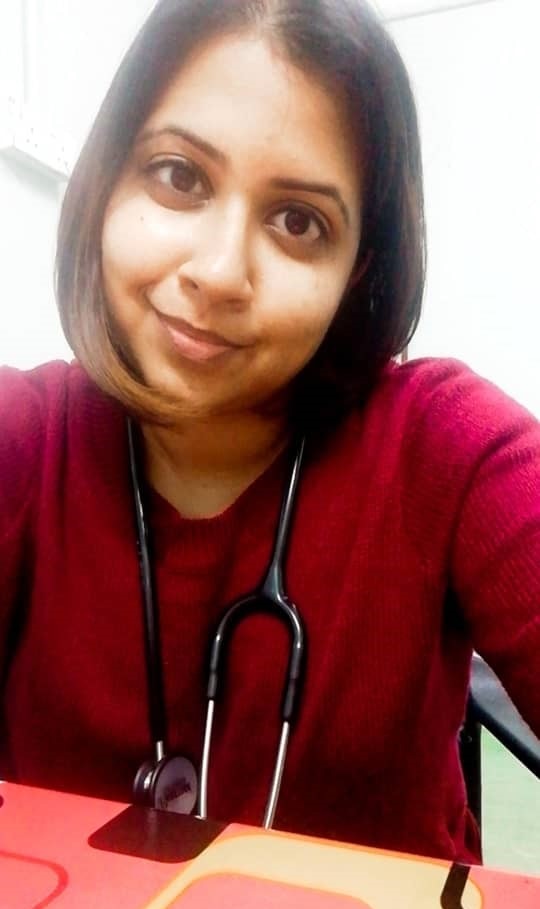
Dr Sara
Dr Sara Ruth Zachariah is a graduate of FMHS. She had
been working in the medical field for five years. When asked about what
inspired her to pursue this field, she said, “I chose to become a doctor
because of my family and I was inspired by the stories I heard about my
grandfather who worked as a medical assistant in a remote clinic at the oil
palm estate. I was further inspired at the age of 12 when I helped my
parents to look after my grandmother when she fell ill.”
“One of the challenges is working on-call shifts for
30 hours. I try to be mindful of my health and wellbeing by taking breaks in
between for my meals and power naps! Another challenge is breaking bad news.
It doesn't get easier! It has taught me how to assess and respond to
emotional reactions whether from the patient or their loved ones. One of my
proudest achievement would be completing my housemanship in East Malaysia
and having the opportunity to be part of the pioneering team in treating the
Covid-19 patients as a medical officer. It was an eye-opening experience
witnessing firsthand the emotions and anxiety faced by these patients, being
isolated and far away from loved ones. Also, a reminder to be grateful for
mine,” she added.
She explained the reason she chose to pursue her medical studies at UTAR, “I chose UTAR because it was a well-known and reputable university which provided medical degree at an affordable fee. I also liked the idea of being part of the first batch of medical students produced by UTAR.” “There are going to be tough times where you doubt yourself and the choices made, but do take a minute and reflect why you are in this profession in the first place; which is to treat people who are in need and unwell,” Dr Sara advised and added, “Every doctor should have humility whereby they must be able to accept and acknowledge the mistakes done and be willing to work at it.” Dr Sara currently works as frontline staff in Taiping, Perak.
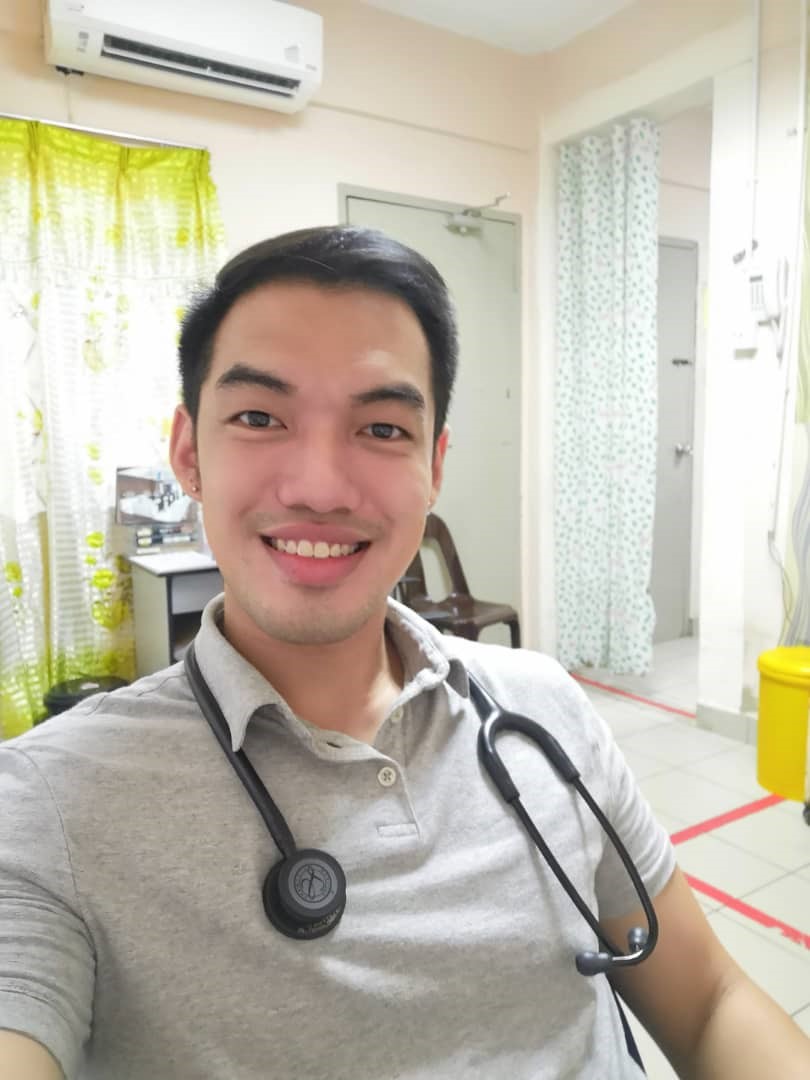
Dr Eugene Tan
UTAR alumnus Dr Eugene Tan was among the third batch
of students in the FMHS. He had been serving as a doctor for almost three
years now. He chose this profession because it was challenging, yet humbling
and fulfilling at the same time. According to him, new information are
constantly made available, new protocols are constantly introduced, hence
making changes inevitable in the medical field. “One of the most challenging
aspects of the medical field is that it is always changing; what may be
relevant in the recent past, may not be so today. So I believe adaptability
is a quality important to all doctors in this respect,” he said.
He added, “My advice to those who wish to pursue this
field is not to be afraid to talk to your peers or seniors whenever you
encounter hardships as it can get quite tough and stressful in this field.
We will all go through similar situations at one point or another in our
journey, hence sharing with one another could offer insight or solutions to
your problems.” When asked of the reason why he chose UTAR, he said, “UTAR
was already an established university, to begin with, and had a stellar
reputation back when I joined, and also the medical faculty has some of the
most well-respected professors in Malaysia.”
“It is still an ongoing battle against the Covid-19 and we are still far from winning it so I wouldn’t call it an achievement, nevertheless I still feel honoured to be able to play a role in curbing the spread of the pandemic,” he finally added. Dr Eugene Tan is currently serving in Kota Kinabalu.
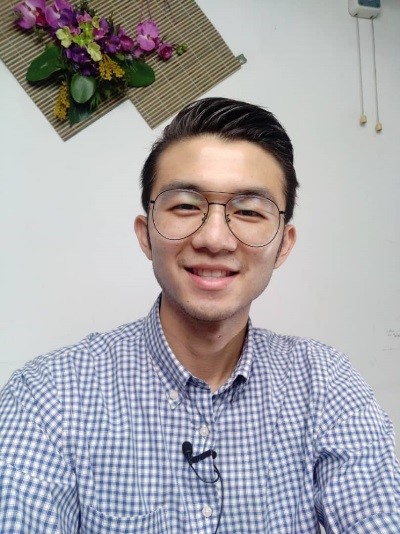
Dr Tan
“I've been working as a doctor for the past five
years. I chose this profession because I wanted to help others. Indeed,
being a doctor is not the only way to effectively help people in need, or
the most efficient. However, for me, being a doctor means being equipped
with the knowledge that helps others to do good more than harm,” said
another UTAR alumnus, Dr Tan Loong Hui.
Speaking of the challenges met in the medical field,
he said, “The challenge was the initial shock of being in contact with real
people, real lives which brought real responsibilities. Often an acute sense
of inadequacy and helplessness, when faced with issues beyond my knowledge
or control, would be the biggest challenge of all.” According to him, these
challenges do not fade; one simply has to grow to accept them with humility
and resourcefulness, and also by seeking help.
He said, “Working in a fast-paced, ‘make no mistakes’
environment has made many of us, me included, blind to our achievements, and
numb to our accomplishments. Pride is a dirty word in Medicine, and rightly
so, but it is sometimes skewed towards low self-esteem, and it discounts all
our efforts. Nonetheless, I remember the smile patients give us, when we are
able to relieve them of their ailments; when they're treated with kindness;
and when a depressed patient tells me they are able to work and have a
fruitful life after treatment; that gives me a reason to keep striving for
my patients and myself,” Dr Tan said and added, “Of course, when I was able
to provide relief to the Covid-19 efforts, I felt like a young hopeful
medical student, out to ‘save the world’ again. Regardless of how much or
little my efforts really helped in managing the pandemic, I believe my
contribution was worthwhile.”
“There are many qualities that a doctor will hone
over their years of practice to survive and thrive. Although it is
impossible to list down, these are some of them. Resilience, both physically
and mentally, is a good safeguard for our health and sanity, and to do that,
one must not go at it alone. Having a strong social support group,
personally and professionally, has helped me tremendously. Being a doctor
also requires one to be able to be comfortable with not knowing all the
answers, to be able to set boundaries, and to be able to communicate clearly
and effectively,” he answered when asked about the qualities a doctor should
possess.
Dr Tan is from the pioneer batch of FMHS. According
to him, the affordable price offered by the University was the main factor
why he chose UTAR in the first place. “We are conditioned as a society to
believe only highly expensive things meant quality, however that is not
always true. UTAR as a not-for-profit organisation has allowed lecturers and
students to focus on the true purpose of education, with less emphasis on
commercial values, or fame, or whatever drives the market. UTAR provided us
with as much privilege as others to pursue the same dream and cultivate
potentials that have just as much, or even more potential than the others.
And UTAR protects the rights of all to pursue an education that one
chooses,” Dr Tan said.
“The medical profession in Malaysia is undergoing an
extremely volatile period. Job security is low, with the advancement in
career for many young doctors hanging in the balance. If you are well-aware
of all these, and still want to continue to be a doctor, we welcome you with
open arms and will cheer you on and support you to achieve this goal,” he
advised the juniors at UTAR.
He added, “Remember that we are all gifted with free
choice, make use of that freedom wisely. Choose medicine consciously, and
when you feel downtrodden in your career, remember why you chose it in the
first place, and that will save you many heartaches and tears. Always be
ready to accept help and advice; question all knowledge passed to you; be
consciously responsible for your choice and actions, and trust me, you’ll
become a great doctor.” Dr Tan is currently serving in Selangor.
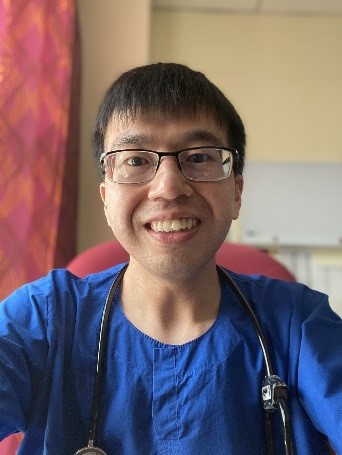
Dr Cheah
When asked of the reason why he chose this
profession, Dr Cheah Yu Wei from the pioneer batch of FMHS, recalled an
interesting event that took place during the pre-admission interview to UTAR
FMHS. “Interestingly, that was one of the questions Prof Dr Alan Ong Han
Kiat asked me during the pre-admission interview to UTAR. Well, it was my
ambition and I have been pursuing this since primary school. My final aim is
to become a nephrologist, running my own clinic or dialysis centre in the
private healthcare sector,” said Dr Cheah.
“Frankly speaking, I have asked myself this question
a lot of times during the last five years. This was not an easy road to take
and continue to go on, I did not expect so many sleepless nights, separation
from my family and loved one to serve the public,” he added. Nevertheless,
he is grateful that the transferal to Kota Kinabalu, Sabah has forced him
out of his comfort zone and gave him a chance to explore the exquisite
culture of Sabah, a place which truly represents Malaysia.
According to Dr Cheah, doctors have to be versatile
in many ways, may it be soft skills or core clinical knowledge. As a doctor,
one has to work with different people, different patients and different
specialities. “I believe in general, doctors must be able to work under
pressure, doctors must be highly proficient in clinical skills and soft
skills, and most importantly, doctors must possess the will to continue the
study of the ever-changing knowledge in the field of medicine. On the other
hand, doctors must recognise their limit of knowledge and skill and the
timeliness to call for help from peers or seniors. A good doctor should be a
good tutor to the junior medical practitioner and should always be ready to
help other colleagues who are in need of help,” he said.
Dr Cheah shared, “In terms of working, during
housemanship, I believe I was a good house officer. So most of my formal
medical officers would like to have me with their on-calls. As a medical
officer, I would try my best to ensure my patients receive the most complete
care and management plan prior discharge as well as overcoming the social
issue and hurdle in getting the best healthcare from the MOH. During this
pandemic, I have pledged myself to work with the Covid-19 team from late
March 2020 till date.”
Speaking of why he chose UTAR, he said, “Other than
providing reasonable tuition fees among all the other private medical
schools, the lecturers were the most important reason why I chose UTAR. Our
respectable lectures were among the earliest batch of locally trained
doctors who understood the nature of doctors the country needs. Hence, the
lecturers trained us to cater to the need of the healthcare system in
Malaysia. The clinical years prepared us well to handle housemanship and
even until the level of professional exams for various speciality exams
(MRCP, MRCOG, MRCPCH, etc).”
“As a part of the medical fraternity, especially in
the public healthcare sector, we have to always be prepared to face any
circumstances and arrangement by the ministry, may it be leaving your loved
ones, facing extended working hours or sacrificing rights to take leaves for
the benefit of service. Things will be hard in the beginning, however as
time goes by your patients, colleagues and seniors will appreciate your help
and your presence in the system; you will know that you are on the right
track,” Dr Cheah advised.
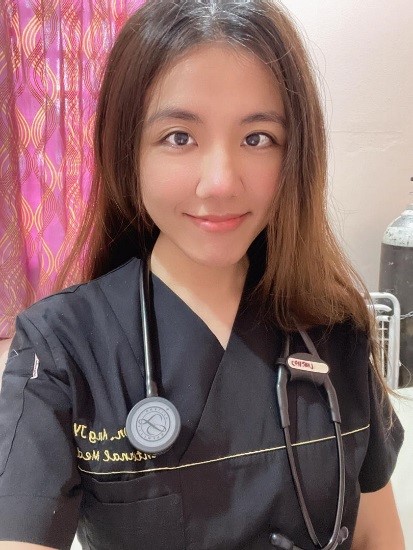
Dr Ang Jie Ying
UTAR alumna Dr Ang Jie Ying started her life as a
medical student in May 2010. She spent five years to complete the MBBS
course and two years to complete the houseman training in Hospital Sultanah
Aminah Johor Bahru. She was among the first batch of MBBS students in UTAR.
Currently, she is serving at Tawau, Sabah as a medical officer in the
Medical Department.
“I have always had a strong interest in being a
health care worker from the time I was 12 years old. The interest enhanced
greatly when I witnessed the ‘magic’ performed by the paediatrician who
cured my younger sister of her illness,” Dr Ang shared. She also said that
she visited a lot of education fairs with her parents as she was growing up
and later discovered her interest in the medical field. “I felt like I
wanted to dedicate my life to it. It was what I wanted. The medical field is
fascinating as you can never know everything; there is always new
information, new technologies, and new cures. And I wanted to be like the
doctor who attended my sister. I wanted to cure people as they could be
someone’s parent or sibling,” she added.
“Only a health care worker knows and understands how
precious and how merry it is when you manage to improve a disorder or save a
life. Sometimes you are appreciated and sometimes you are not, but in the
end knowing that you yourself have actually played a crucial role in
restoring their health or relieving their pain, be it the patients or their
families, is rewarding. You also need to know when to call for help. Health
care workers are human too. We all have feelings and emotions like all the
other humans; in order to maintain your pace, you must know when to have a
break and when to ask for assistance. Also, remember this, you need your
family, and your peers,” Dr Ang shared.
She also said, “Building interaction and rapport with
patients and their families could help alleviate their pain and suffering as
well as easing their anxiousness and concern. Being in the medical line can
sometimes be physically and mentally exhausting. However, your soul will
feel fulfilled; at some point in life, you will recall why you have chosen
this line of work. The day your patients recover, you will definitely feel
your role in it, strongly and deeply. These moments are the reasons why I’m
holding up till now.”
According to Dr Ang, there are various areas to
consider in the medical field. “You can work in the research lab, invent new
drugs and prompt new medical discoveries; you can contribute in managing the
health care industry, or even participate in the medico-legal area for
health care workers and patients’ rights,” said Dr Ang.
Advising the younger generation, she said, “I do
encourage others like my younger sister, who is currently completing her
final year M.B.B.S studies at UTAR to take up the challenge and
responsibility as a Malaysian citizen to serve the people and the country.
Understand yourself, discover what you truly love and truly admire; then you
will remain strong and compassionate, compassion towards humanity, in this
eventful medical life.”
Dr Ang said that she reviewed the background of UTAR,
the programme it offered (MBBS) as well as the lecturers before choosing the
university. “UTAR provided excellent quality in learning and teaching. The
lecturers’ profile showed that they were qualified professionals who can
nurture students in respective fields. Although my batch was the first batch
to attend the MBBS course, UTAR’s ex-president Ir Academician Emeritus Prof
Tan Sri Dato’ Dr Chuah Hean Teik was highly capable and he brought UTAR to
its high peak. This attracted me to select UTAR for my MBBS study. Besides
that, UTAR also takes consideration for parents by providing an affordable
fee for their children. If I were given a chance to go back to the year
2015, my choice would still be the same,” Dr Ang enthused.
The UTAR MBBS programme follows a systemic and
integrated approach that aims to equip graduates with not only the required
clinical skills, but also effective communication skills to function as
competent and caring doctors. Academic foundation, analytical and critical
thinking ability will be provided for engagement in life-long learning,
research and continuing professional development. Ethical values,
professionalism and moral responsibility to both patients and the community
will be instilled in the UTAR graduates.
There are numerous courses available for
specialisation and sub-specialisation, some of which include, Obstetrics &
Gynaecology; Paediatrics; Orthopaedics; Psychiatry; Ophthalmology;
Otorhinolaryngology (ENT); Anaesthesiology; Radiology; Family Medicine;
Emergency Medicine; Public Health; Internal Medicine with subspecialty in
Cardiology, Rheumatology, Dermatology, Infectious Diseases,
Gastroenterology, Respiratory Medicine, Rehabilitative Medicine, Metabolic &
Endocrine Medicine, Geriatric Medicine; General Surgery with subspeciality
in Cardiothoracic Surgery, Plastic Surgery, Neurosurgery, Hepatobiliary
Surgery, Colorectal Surgery, Breast & Endocrine Surgery; and Pathology with
subspeciality in Haematology, Histopathology, Chemical Pathology, Forensic
Pathology, Medical Microbiology.
For more information, click
here.
Wholly owned by UTAR Education Foundation Co. No. 578227-M LEGAL STATEMENT TERM OF USAGE PRIVACY NOTICE